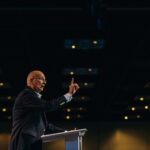When can my child partake in communion? Perhaps you’ve pondered this question regarding your own child. Unfortunately, it isn’t a topic frequently discussed in Reformed and Evangelical circles. Communion, also known as the Eucharist or the Lord’s Supper, is one of the two sacraments upheld by Protestant Christians; the other being Baptism. Below we’ll define the sacrament of communion and then address the question of when children should be able to participate in it.
What is the Sacrament of Communion?
The Westminster Shorter Catechism describes a sacrament as “a holy ordinance instituted by Christ in which, by perceivable signs, Christ and the benefits of the New Covenant are represented, sealed, and applied to believers” (Q92).
Communion is a sign and seal of the ongoing renewal of God’s covenant people.
In other words, whereas baptism is a sign and seal of incorporation into God’s covenant people, communion, on the other hand, is a sign and seal of their ongoing renewal. In the same way that God sealed his covenant with Noah with a rainbow theophany (Genesis 9:11-13), or with Abraham using circumcision (Genesis 17:11), the new covenant promises of the gospel are sealed through the visible actions of baptism and communion. Children were not exempt from this covenant.
Communion, then, serves as a sign that directs us to the grace of God through Christ, as he renews those who partake in it. But what does partaking in communion truly signify?
Partake in Communion as a Sign of Renewal
As a sign of renewal, our Lord Jesus Christ commanded us to partake in communion (Luke 22:19; 1 Corinthians 11:23-26). The Westminster Larger Catechism asserts that partaking in communion benefits our spiritual enrichment in Christ. It reads: “feed on (Christ’s) body and blood to their spiritual nourishment and growth in grace; have their union and communion with him confirmed; and testify and renew their thankfulness and commitment to God and their mutual love and fellowship with each other, as members of the same mystical body” (Q168).
Partaking of communion is a spiritual act empowered by the Spirit through faith.
In other words, partaking of communion is a spiritual act empowered by the Spirit through faith. Christ’s body and blood are mystically represented in the elements of bread and wine. However, the bread and wine do not transform into Christ’s post-resurrected body, for the latter is in heaven and the former on earth. Through faith, we are united to Christ’s body, which nourishes and feeds us. This raises the question of whether a small child has faith in Christ, a prerequisite for partaking in communion.
Are Children Eligible to Partake in Communion?
This question is related to another, broader question: who is eligible to receive communion? As we have seen, the answer is those who are part of the new covenant community. In the Reformed tradition, professing parents and their children are included in the new covenant. This is partly why most Reformed and Presbyterian churches baptise infants, even though the sacrament does not save them. Does it follow, then, that a covenant (baptised) child should partake in communion?
Participants need to exercise a level of introspection that exceeds that of a child.
To answer that question, we must consult Paul’s treatment of the Lord’s Supper in 1 Corinthians 11:17-34. For Paul, the participants in the communion must “examine” themselves; and be able to “discern” the body of Christ (1 Corinthians 11:29). This means that the participants need to exercise a level of self-assessment that exceeds that of a small child. To do otherwise incurs judgment upon oneself (1 Corinthians 11:29).
However, much debate ensued over what “discerning the body of Christ” means. The paedobaptists contend that the phrase refers to acknowledging unity among the Christians in Corinth rather than requiring introspection as a requisite to participating in communion. Their interpretation of 1 Corinthians 11:29 appears to be based on the division in the church (1 Corinthians 11:18), a dysfunctional congregation (1 Corinthians 11:21), and Paul’s admonition for unity (1 Corinthians 11:12), love (1 Corinthians 11:13), and order (1 Corinthians 11:14).
Profession of Faith as Requisite to Partaking in Communion
Regardless of one’s perspective, the text is clear that the communicant must engage in a certain level of introspection. This is why we regularly “fence” the table during our worship services and caution non-believers not to partake in communion. Thus, though baptised and included in the covenant community, small children should abstain from participating in communion. Not until they can profess their faith. This decision is supported by the Heidelberg Catechism (81), Belgic Confession (35), and the Westminster Larger Catechism (177).
Children should not participate in Communion until they profess their faith in Christ.
In my local church, we ask parents to keep their children from partaking in communion, until they profess their faith. As elders, we do not enforce a strict age limit. Instead, we request parents who believe their child can profess their faith in Christ to bring this before the elders. Together, we can evaluate the credibility of that profession and admit the child to communion.
Thus we recommend having regular discussions about communion with your children. These conversations are opportunities to explain the significance of Christ’s death. This will help determine whether the child has understood and embraced the gospel through faith.











